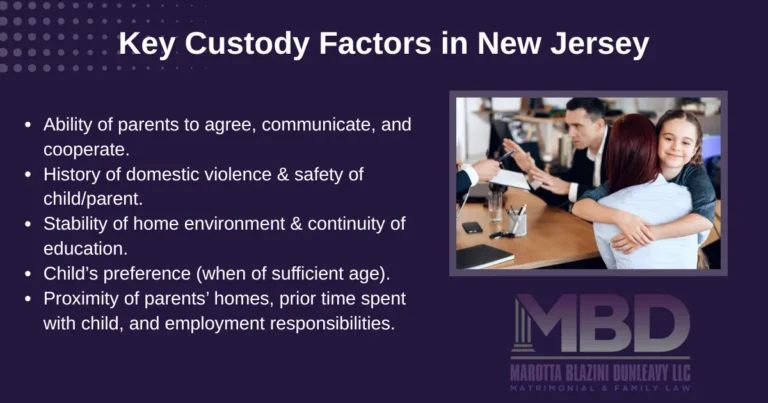Child custody is often one of the most emotional and disputed issues in divorce and separation cases. Parents usually have strong and differing views about what is best for their children, and the outcome can feel deeply personal. Whether you are establishing custody for the first time or seeking to modify an existing arrangement, understanding your rights and how New Jersey courts handle custody can make a challenging process more manageable.
At Marotta Blazini Dunleavy LLC, our Bergen County child custody lawyers provide compassionate, strategic guidance. We are dedicated to protecting your relationship with your child and helping you work toward a stable, supportive parenting plan.
New Jersey courts decide custody matters based on the best interests of the child. Judges consider many aspects of the child’s life, the parents’ relationship, and each parent’s ability to provide a safe, stable environment. Some factors include:
The goal is not to favor one parent over the other, but to create a custody plan that supports the child’s long-term well-being.

Custody in New Jersey covers both physical custody (where the child lives) and legal custody (who makes major decisions about the child’s upbringing). The main types include:
New Jersey does not set a specific age at which a child can decide where to live. However, judges may consider a child’s preference if the child is mature enough to provide a well-reasoned opinion. Courts often give greater weight to the views of teenagers than younger children, but a child’s preference is just one factor among many. Judges also examine whether the preference is genuine or influenced by pressure or loyalty conflicts.
Parenting time—sometimes called visitation—is the scheduled time a child spends with the noncustodial parent. Even when one parent has primary physical custody, the other is usually entitled to regular parenting time unless it would endanger the child.
Parenting time can be structured with a detailed schedule or remain flexible if parents cooperate well. Typical schedules include alternating weekends, midweek visits, holidays, school breaks, and extended summer periods. In cases involving safety concerns, courts may order supervised visitation or restrict overnight stays. Every parenting plan is tailored to the child’s best interests and the family’s needs.
Custody and parenting time disputes are common during divorce. If parents cannot agree on a plan, the court may require mediation, where a neutral professional helps parents reach a resolution outside of trial.
If mediation is unsuccessful, the case proceeds to a custody hearing. Both parents can present evidence and testimony, and the judge may consider expert evaluations, witness statements, or appoint a guardian ad litem to represent the child’s interests. Having a skilled Bergen County child custody lawyer ensures your perspective is presented clearly and effectively.
Yes. Custody orders can be modified if there has been a substantial change in circumstances that affects the child’s best interests. Common reasons for modification include:
To modify custody, you must show that the change is significant and that the new arrangement better serves your child’s needs.
Courts take custody orders seriously, and violations can negatively affect both parents and children. Common violations include:
These actions can lead to enforcement proceedings, contempt findings, or modifications of custody arrangements.
If your co-parent disregards a court-ordered custody arrangement, you have legal options, including:
It is important to document all violations and consult a Bergen County child custody lawyer before taking legal action. Courts aim to protect children’s stability and ensure compliance with custody orders.
Child custody matters are emotionally charged and legally complex. A knowledgeable custody lawyer can help you understand your rights, prepare for court, and work toward a parenting plan that prioritizes your child’s needs.
At Marotta Blazini Dunleavy LLC, we are committed to protecting your parental rights and guiding you through every step of the process. Whether you are establishing custody, seeking a modification, or enforcing an existing order, we will advocate for an outcome that supports your child’s best interests and provides peace of mind for your family.
If you are facing custody concerns, our dedicated Bergen County child custody lawyers at Marotta Blazini Dunleavy LLC can help you navigate the process with clarity and confidence. Call 201-368-7713 or complete our online form to schedule a free consultation. Located in Maywood, New Jersey, we represent parents throughout Bergen County and the surrounding areas.
OUR PRACTICE AREAS
CONTACT OUR FIRM
To schedule a consultation with one of our attorneys, fill out the form below!